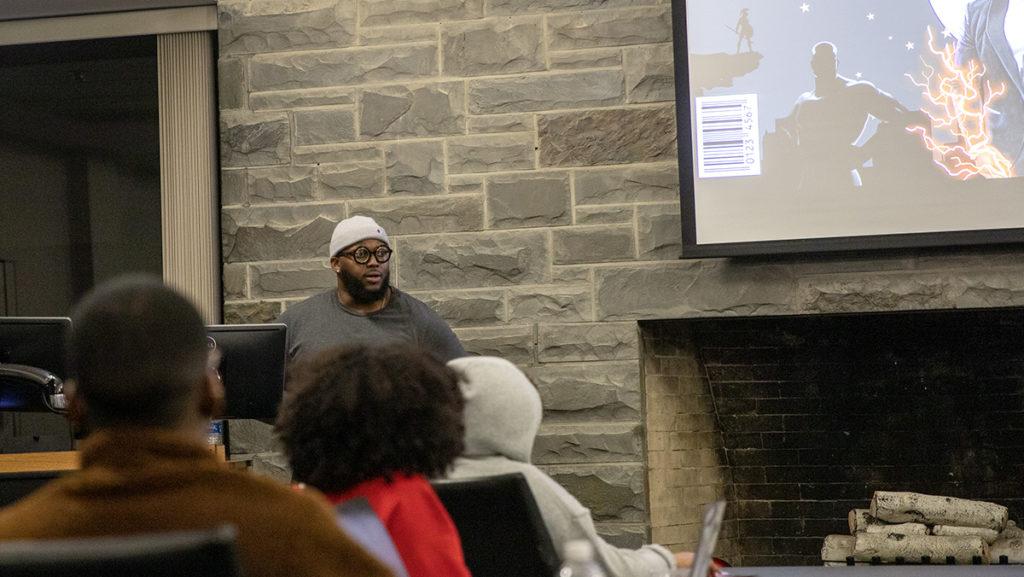RaKim ‘RahK’ Lash, former assistant director for Multicultural Affairs and director for the Center for Inclusion, Diversity, Equity, and Social Change at Ithaca College, has a secret he is sharing with the college. He is a Black cosplayer, a hobby that he wishes to share with others. Lash received the space to do so with his panel “We Are Black Cosplay: Creation Amplified Through a Community that Cares” on Feb. 23 in the Taughannock Falls Room.
“We Are Black Cosplay” was a discussion headed by Lash. He is currently settled at Keuka College in Keuka Park, New York, as the director of Student Engagement. He also made sure to plug his side hustle as a DJ.
The panel, in its own description, was meant to be a space to discuss the power of community. Lash said it was the responsibility of the person to find these communities and participate in creating that relationship in the first place.
Before he began telling his story, Lash asked the audience, a mix of students and faculty, what they know about cosplay. In the very literal sense, it is a portmanteau of “costume” and “play.” There were many responses, repeating the idea of “connection” and “expression.” Lash gave his own answer, rejecting a traditional definition that would impose an idea on each person’s unique relationship with cosplay, and instead highlighted what he considered to be the fundamental piece of the hobby: It is a communal performance.
Beginning his discussion of community and performance with his own childhood, Lash said his upbringing was one that was full of love, but also one that ingrained into him a mindset of putting away the parts of him that were rejected by others.
“Whether it was on the school bus, to the classroom, there was always this pop quiz and in that moment you had to make a decision about ‘Am I going to be myself, am I going to actually stick to and like what I like, and allow myself to be in that space and accept the consequence that comes from that, or am I going to tuck that away to make this moment a little easier?’” Lash said.
Lash said that his nerdier interests were not becoming of Black boys. As a kid, Lash said he played pretend as the superhero team Power Rangers with his white peers. When he showed a picture of the Power Rangers, he pointed out to the audience the two people of color on the team: an Asian girl, the Yellow Ranger, and a Black boy, the Black Ranger. The Red Ranger, the team leader, was the one he most identified with, but he was made to be the Black Ranger every time.
“There are notions of, ‘You can’t be this, because you’re not that.’” Lash said. “And a word that a lot of people would throw around is that I’m a ‘purist.’ If Superman is white, Superman should be white. ‘I’m not racist, I’m just a purist.’”
Racebending, the reworking of established characters from one ethnicity to another, has been a topic of debate among pop culture fans. In 2022, actress Leah Jeffries was the target of racist remarks after failing to match the in-book description of character Annabeth Chase in “Percy Jackson and the Olympians.” Actor Ismael Cruz Córdova was similarly a target of online harassment for his portrayal of Arondir in the “Lord of the Rings” spinoff “Rings of Power.”
Lash himself said he had a hard time finding community until he came to Ithaca. He recounted a lesson he learned from a student in his first year as an assistant director after joking to them about the lack of Black people at Ithaca College.
“The student looked at me and said, ‘That’s a very disrespectful thing to say,’” he said. “It got real real quick. They were like, ‘Whether you have sought out that community, there’s probably community here. There was a community that’s been here before you, there’s probably a community that’s going to be here after you choose to leave.’”
That comment stuck with him, and after moving to Washington Heights in New York City and wanting to build community for himself, he said he decided to finally reach out to the group he had admired from afar for years: Black cosplayers.
“It was like I was being introduced to a new world that was just for me,” Lash said.
When sophomore Ryan Carty, who attended the panel, asked how Lash was able to put himself out there and build community after years of being hurt, Lash said it was a necessary process of acknowledging that pain and being willing to work against it.
“I haven’t been around Black cosplayers in person,” Carty said. “The only way I see them is through TikTok and then I fantasize that I’m in a group with them but I never get that chance to walk up, mostly because I’m shy or I feel as if I’m not ready to step into that field.”
Sophomore Ariana Clark was already a cosplay fan, having done it as a hobby for several years. She had even made a dagger out of pasta boxes for a costume based on an anime character, Mikaela Hyakuya from “Owari no Seraph,” a human turned vampire turned demon. She said that for her, even attending the event was a step to find people like herself.
“I’m an introvert, so even coming to this event was kind of overwhelming, but I’m glad that I came and I think I’m going to try to go out more,” Clark said.
During a trip with the college’s Martin Luther King Scholars to Ho Chi Minh City in Vietnam, Lash said he learned a song that has stuck with him on his journey.
“It’s me, it’s we, it’s us who build community,” Lash said. “That word community. That’s something to explore and that I’m still learning.”














